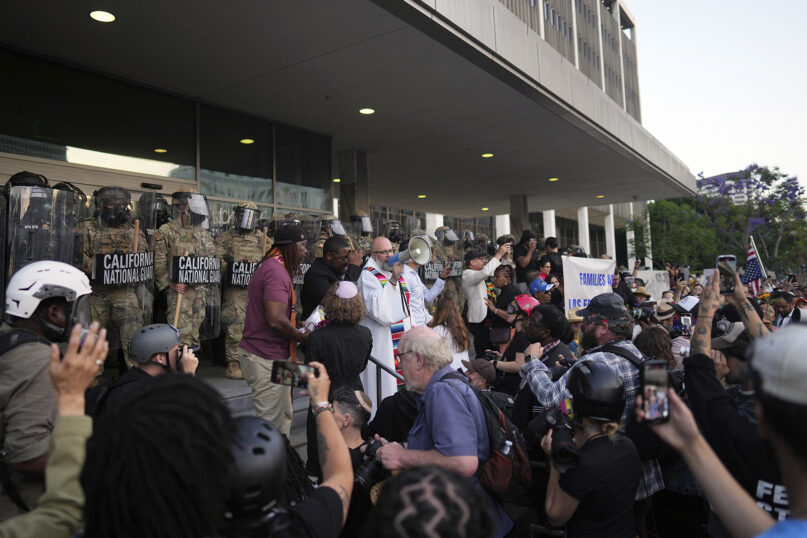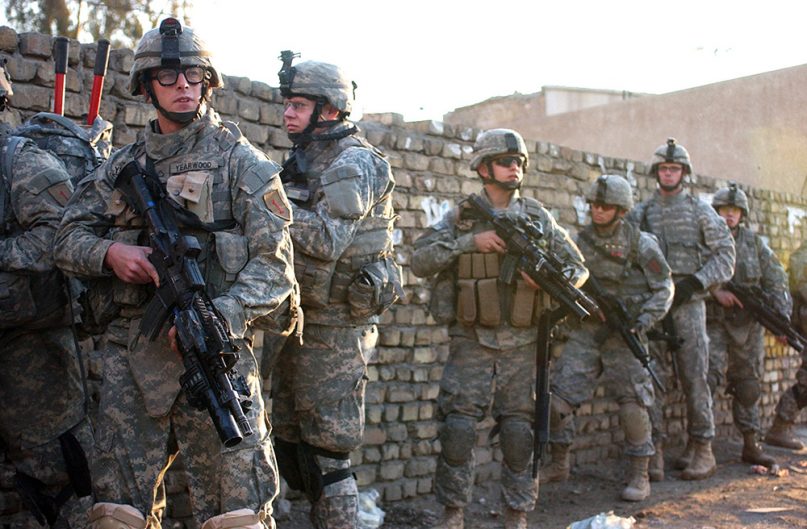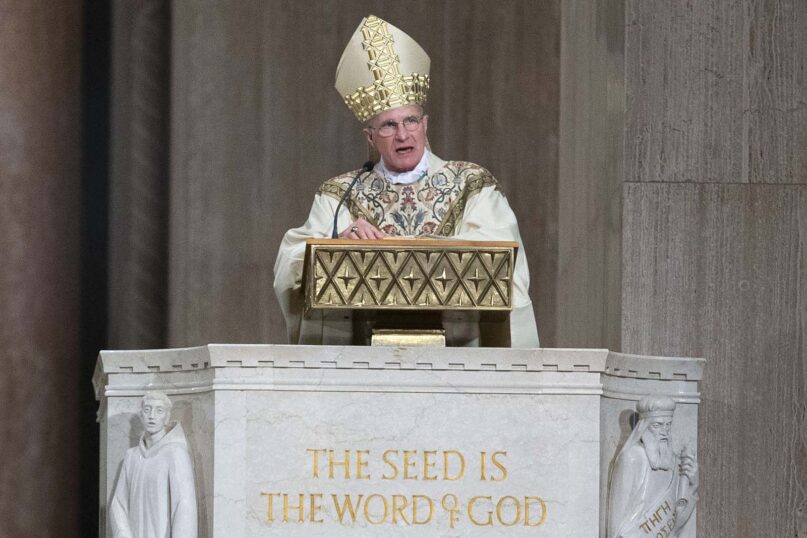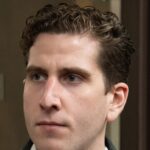(RNS) — On June 22, the morning after President Donald Trump announced U.S. forces had bombed several nuclear sites in Iran, Archbishop Timothy Broglio issued two responses, one for each of the two hats he wears — president of the U.S. Conference of Catholic Bishops and as archbishop for the U.S. military services.
As USCCB president, Broglio wrote, “we beg Almighty God to end the proliferation of acts of war and to inspire dialogue before more innocent people are harmed.” As shepherd for service members, he shared his prayers for them, their families and peace.
But on the use of troops to enforce immigration policy and mass deportations, Broglio has shied away from criticizing the commander-in-chief or the uniformed leadership, revealing the tricky position of occupying two roles that have never been held by the same man.
Since Trump took office in late January, he has sent thousands of service members to guard the southern border; worked toward using military bases as detention centers, including sending migrants to Guantánamo Bay; deployed the military to respond to protests against deportations in Los Angeles; and explored involving the National Guard in interior immigration enforcement.

A clergy person addresses protesters as California National Guardsmen stand in line in front of a federal building in downtown Los Angeles, June 10, 2025. (AP Photo/Eric Thayer)
While there is certainly precedent for deploying military support for border operations and for housing migrants on military bases, Pope Francis left no doubt that he saw the Trump administration’s immigration policy as contrary to church teaching, and his successor, Pope Leo XIV, has signaled his agreement. As then-President-elect Trump outlined his plans for mass deportation last November, the USCCB’s migration chair promised bishops would “raise our voice loudly.”
As the Senate barrels towards passing a budget bill that would massively increase funding for immigration enforcement, a group of U.S. bishops seemed to decide the conference, and Broglio, had not been loud enough, releasing a letter Thursday co-signed by other interfaith leaders that explicitly asked senators now debating the bill not to vote for it.
Their letter focused almost entirely on the immigration enforcement funding. The version of the budget passed by the House would quadruple U.S. Customs and Border Protection’s budget and increase immigration detention capacity by 800%.
It was also timed to coincide with a letter Broglio and other USCCB leadership released Thursday, urging senators to make changes to “provisions that will harm the poor and vulnerable,” including immigrants. The USCCB letter, which also highlighted aspects of the bill the conference approved of, did not ask senators to go against Trump to defeat the bill.
Buried at the end of the USCCB’s recommendations was support for an amendment preventing the Department of Defense from participating in detaining noncitizens. “We strongly reject efforts that blur the lines between legitimate immigration enforcement by specially trained civil officers with that of military action,” the bishops wrote.
But in his own statement accompanying the letter, Broglio, the fourth archbishop for the military services and the first never to have served as military chaplain himself, did not address the role of his spiritual charges in carrying out those deportations, saying only that the bill “fails to protect families and children by promoting an enforcement-only approach to immigration and eroding access to legal protections.”
Since Broglio began leading the archdiocese in 2008, he has sometimes been more outspoken, weighing in on various military policies, particularly regarding abortion and LGBTQ+ service members, including opposing a 2013 policy extending benefits to military members’ same-sex domestic partners, supporting COVID-19 vaccine exemptions based on conscience for Catholic service members and recently praising Trump for ending funding for military members to travel for abortions.
Broglio’s office did not make the archbishop available for an interview.
Broglio’s predecessor as archbishop of the military, now-Cardinal Edwin O’Brien, weighed in repeatedly with moral assessments during the Iraq War and counseled service members as the conflict was starting that they should listen to the president rather than the pope.

U.S. Army soldiers from Charlie Company, 1st Battalion, 26th Infantry Regiment, 2nd Brigade Combat Team, 1st Infantry Division perform a cordon and search operation in Al Adhamiya, Iraq, Feb. 21, 2007. (U.S. Army photo by Sgt. Jeffrey Alexander/Creative Commons)
In a 2003 Mass at the U.S. Military Academy at West Point, O’Brien told service members that despite Pope John Paul II’s opposition to a war in Iraq, “you are not bound by conscience to obey (the pope’s) opinion. However, you are bound in conscience to obey the orders of your commander-in-chief, and if he orders you to go to war, it is your duty to go to war.”
At last November’s bishops’ conference meeting, where Trump’s reelection and rhetoric about mass deportations were prominent topics, Broglio said in response to a question at a press conference that mass deportations might be bad economic policy but that, “unfortunately,” under U.S. law, military members cannot conscientiously object to specific policies.
“I would certainly counsel, though, as I have in the past, that no one can be obliged to act against his or her conscience,” said Broglio, adding that the archdiocese and chaplains would work to defend conscience rights to the best of their ability.
Experts said Catholic chaplains may be wrestling with the morality of the mission. “Catholic chaplains potentially face some of the most fraught tension between their own church teachings and what the government is asking the military, or commanding the military, to do right now,” said Ronit Stahl, author of “Enlisting Faith: How the Military Chaplaincy Shaped Religion and State in Modern America.”
Stahl, an associate professor of history at the University of California, Berkeley, said officers and enlisted soldiers may seek out chaplains for counseling and that chaplains can also play a “prophetic” role.

The Rev. Bill Devine, 7th Marine Regiment chaplain, speaks to U.S. Marines assigned to the 5th Marine Regiment during a Catholic Mass at one of Saddam Hussein’s former palaces in Tikrit, Iraq, on April 19, 2003. (Photo by Lance Cpl. Andrew P. Roufs/U.S. Marine Corps/Creative Commons)
The Rev. Timothy Mallard, an Evangelical Presbyterian minister who served close to 37 years as an Army chaplain before retiring as a colonel, told RNS that chaplains serve an important role for soldiers of any faith because they have “the power of privileged communication,” meaning that they can have confidential conversations about conscience.
Mallard, who was deployed in Afghanistan and Iraq and taught ethics at the Army War College, said the goal was to get chaplains to consider ethics from the very beginning, including with classes on American civil-military relations and the Constitution.
Healthy chaplains examine their oath, their conscience and their faith tradition, Mallard said, a practice he engaged in continuously in his own career. “ Their soldiers and families need the chaplain to be the healthy conscience of a command.”
Compared to his brother bishops in the USCCB, who often keep a tight rein on their diocesan priests, experts say that the archbishop for the military, like other denominational leaders, has a more distant relationship to his military chaplains, who receive more hands-on guidance from their commanding officer and supervisory chaplain.
Once a chaplain is deployed to a mission, Mallard said that, often, “ I don’t have the ability to really dial in with (my denomination) unless I’m in a severe crisis.” A more common type of guidance might be a policy or pastoral letter to all chaplains, Mallard explained.

Archbishop Timothy Broglio conducts an Easter Sunday Mass in an empty sanctuary at Basilica of the National Shrine of the Immaculate Conception in Washington, April 12, 2020. (AP Photo/Jose Luis Magana)
Chaplains themselves can resign their commission if they feel they cannot ethically carry out an order, although they may face consequences.
Cardinal John O’Connor, then a chaplain in the U.S. Navy and not yet a cardinal, wrote in 1965: “Vietnam has ten thousand faces. Every chaplain sees a different face.” O’Connor went on to become the Navy’s chief of chaplains and archbishop of New York.
O’Connor’s case, Stahl said, shows chaplains “ may not come to easy answers and their answers may not be public, but it doesn’t mean they’re not trying to take these ethical and moral questions seriously.”



